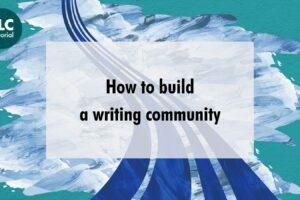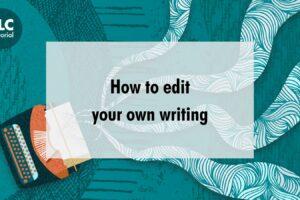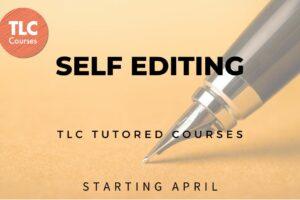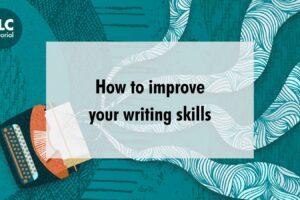How to build a writing community
What is a writing community, and how do you go about building one?
When we welcome writers into our online platform, Being A Writer, we ask them what they are looking for, what motivates them, what the barriers are, and we also get a temperature check on where they are in their creative journey, whether they are complete beginners or well-published veterans.
Across all career stages, forms and disciplines of writing, ‘a sense of community’ consistently features in the top three things writers tell us they are looking for. This is alongside practical tips about how to sustain a creative practice, insights into the publishing industry, and deadlines to stretch towards (even though more than 80% of our members are actively working on a long-form writing project, 40% tell us they struggle to keep up momentum). The reasons for this are manifold and well documented. Writing, like any creative endeavour, is often carried out in isolation, sometimes completely privately. Whilst this suits some, it can be hugely beneficial for writers to find ways to draw on a community of sympathetic others for support, expertise, and growth.
But what is ‘community’? And how do you build one? Read on for our top tips.

Build community based on your needs, and where you are right now
There’s no point worrying about whether you should be on TikTok if you haven’t first thought about what kind of ‘community’ will actually be of best use to you. Try this coaching based exercise:
Write a list of five fundamental needs that are directly related to your writing.
For example:
1. Time (I need to find ways to carve out more time)
2. Validation (I feel I lack confidence and don’t know if what I’m writing is any good)
3. Visibility (I feel invisible, like I’m writing into a void)
4. Craft (I’m fairly confident, but I don’t actually know if in terms of craft this novel is working)
5. Joy (I want to find ways to build a more joyful writing practice as it feels a bit pressurised at the moment)
Now, think about what you already have, and what you have yet to build, to meet these needs. For example: I can diarise an hour every Sunday morning as I have some free time then, and will join a co-writing space where I can meet other writers/ I am going to book a manuscript assessment when this draft is finished/ I am going to find a small-group writing course with writers in the same genre as me).
Ideally you’ll have a mix of things you can already draw on, and things that you need to build out, i.e., not everything in your list will be completely new. You now have the start of a plan for building your personal writing community, that is based on where you are right now, not on where your anxiety, or other people, tell you you need to be.
Identify Allies, Champions, Mentors, and Cheerleaders
A writing community is a village. Villages are made of people, not abstracts. So let’s start with what’s tangible, and think about who you need or want for your writing community. Again, this will ideally be a mix of people already in your life, and those you have yet to make connections with. Pay close attention to people who are on your radar, but not yet connected with you in any concrete way.
Allies are those whom you can work and write alongside. Perhaps this is a writing group (if you’re part of a membership platform like Being A Writer, look for opportunities to buddy-up, read about other members and see who might be a good fit). How many would work for you personally? Would having one regular writing buddy feel good to you, or would you prefer a group?
Champions are people in your personal life who can offer you support when you lose confidence, falter, or feel creatively depleted. Think about who gives you energy, who inspires you, whose friendship nurtures and sustains you. These people are precious. These aren’t the people you send your manuscript to, but the people whose friendship offers much needed grounding and sustenance in times of trouble. Maintain these friendships!
Mentors are people you can reach out to, or learn from, who are doing things with their creative lives that mirror things you yourself would like to do in the future. We don’t suggest writing to complete strangers asking them for a detailed download of exactly how they got to where they are, but we don’t know a writer who wouldn’t welcome a letter of praise to let them know they’re a role model! And if you could ask one magic question of them, what would it be? You never know who might write back. If getting in touch feels to scary or like too much energy expenditure, then make a list of your top five writer heroes. Now, have a think about what makes them feel so special to you. Do you notice any patterns? What are the connections? What is one thing that you can emulate, or learn from and bring into your current practice?
Cheerleaders are those who are perhaps not quite peers, not quite friends, but those with whom you are connected, even if tangentially, through your writing in some way. Who are these people for you? For some writers, their cheerleaders will be potential readers, because this is the number one priority. If that’s the case, perhaps it’s time to look for a good beta reading service. For others, it will feel important to be part of a network of other writers who they don’t need to be chatting to constantly, but like to have nearby (like at Being A Writer!). For yet others, this may be linked to the satisfaction drawn from building a newsletter list, around the writing or perhaps around some aspect of it that’s more about you, the writer (like your love for true crime, your excellent knowledge of knitting, an enthusiasm for LARPing, your passion for social justice, whatever it is you feel is your particular niche). Or maybe you’ve realised that you really love the idea of a podcast and your listeners being your cheerleaders. Think really carefully about what you need, and the answer will be closer than you think.
Nail your narrative
In our recent workshop, ‘How to Build a Platform (Authentically)’, writer and content strategist Hena J Bryan talked about how important it is to have a central narrative that runs through and across her creative content. This is very similar to a mission statement. It doesn’t need to be shared anywhere; it’s just for you. But if you have a really clear idea of who you are as a writer, it will be much easier, once you’ve started building your community, to bring harmony, cohesion, and intention to the image of yourself you are creating. Remember, as a writer presenting yourself in the world, it’s up to you what you decide to present, disclose and withhold. You may be completely comfortable being ‘entirely yourself’, or you may realise that what works best for you is to be more curated and careful version of you: perhaps that’s safer, or more comfortable, or more in line with your writing.
Either way, be intentional! If you can do this, everything you do as a writer will flow more easily: from deciding which platforms work, what content you’d like to present, right down to your voice and even as granular as the visual style of things that you create around your writing and share with your writing community.
And finally….
Build and create equitably
Writing communities are living, moving organisms that have some performatism built in: that’s unavoidable, and natural, as we’re dealing with creators and creative content. But they are made up of real people, with real feelings. Communities only work when they are supportive, and when everyone uplifts each other. You need to build a community for you that serves you, but don’t forget to ask how you are contributing, too. The question is not just what are you hoping to get, but also, what can I give?
If you would like to join a writing community committed to empowering writers to build happier, healthier creative lives, do consider joining us at Being A Writer. We’d love to see you there









